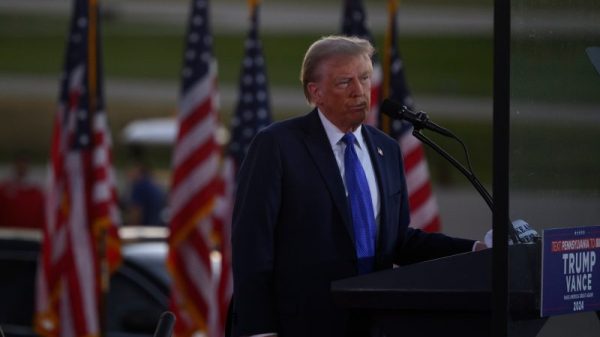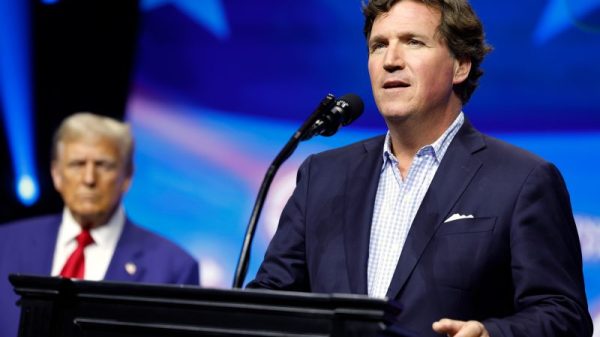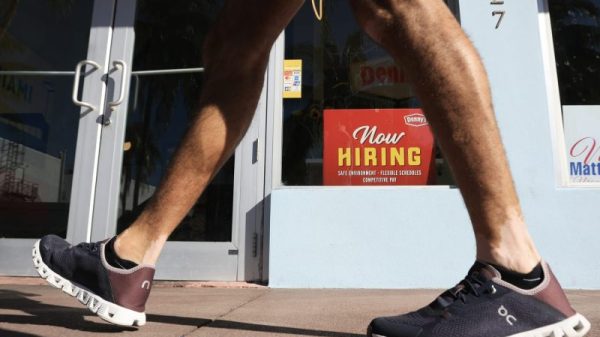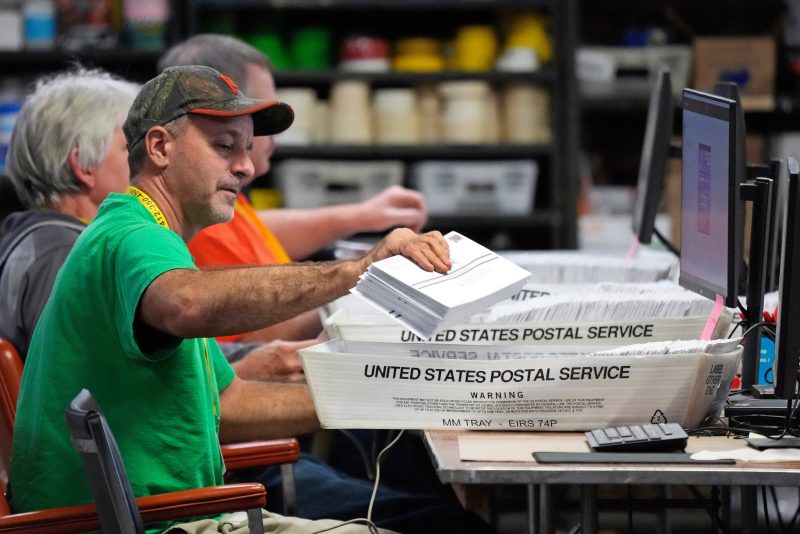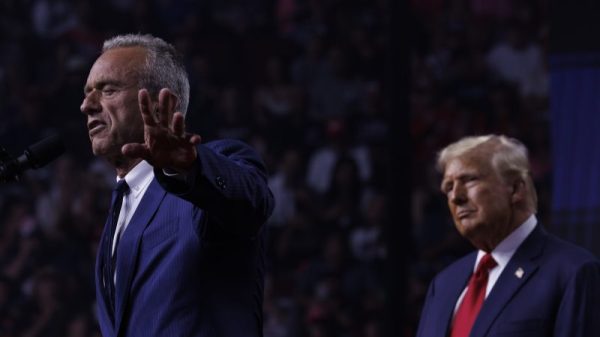Republican lawsuits in Pennsylvania, Michigan and North Carolina challenging the legitimacy of overseas ballots have prompted a backlash among military personnel, their spouses, veterans and elected officials.
Scores of veterans and active-duty members of the armed forces have posted online or contacted their elected representatives out of concern that their votes might not be counted. Military and elected leaders, along with voting rights advocates, have decried the lawsuits as well, calling them a betrayal to the men and women serving the country overseas.
“Literally, these are the people who are putting it all on the line for what we have in America,” said Allison Jaslow, an Army veteran who served in Iraq and now is chief executive of the nonprofit Iraq and Afghanistan Veterans of America. “And we’re going to compromise their ability to have a say in how they vote for who sends them to war? It’s just beyond the pale.”
A group of House Democrats over the weekend called on Defense Secretary Lloyd Austin to guarantee that overseas Americans, including those serving in the armed forces, retain their right to participate fully in U.S. elections, after six Pennsylvania Republican members of Congress filed a lawsuit last week.
The Democrats said they had heard from constituents domestically and overseas after The Washington Post reported on the lawsuits. The Pennsylvania suit asks a federal judge to order that all overseas ballots, including those from military personnel and their families, be set aside and the identities of the voters confirmed before the votes are counted.
The Republican National Committee filed separate lawsuits in Michigan and North Carolina last week alleging that the states allow “overseas citizens who never lived in either state to illegally vote,” according to a news release. Both states allow people born to parents who were previously legal state residents to cast ballots.
Michigan Secretary of State Jocelyn Benson (D) asked a judge Monday to sanction the RNC for what she described in a filing as a “frivolous” lawsuit.
Cleta Mitchell, one of the lawyers who helped former president Donald Trump challenge his defeat in Georgia in the last election cycle, worked with leaders in Pennsylvania on the lawsuit, she told The Post. Mitchell said protocols around overseas voting are “porous,” creating ample opportunities for noncitizens to request ballots and vote illegally.
Mitchell said those who support the lawsuit are not trying to disenfranchise eligible voters but rather trying to firm up a system that makes it too easy for those not entitled to vote in U.S. elections to cast ballots.
She said state-level failures “have created a very unstable, nonverified and nonverifiable voting program that is easily exploited and manipulated.”
Rep. Pat Ryan (D-N.Y.), an Army veteran whose district is home to 40,000 veterans and military families as well as the U.S. Military Academy at West Point, called the Republican lawsuits “an attempt to disenfranchise literal active duty military members who are overseas, risking their life for our country,” as well as their families. Ryan is among the Democrats who signed the letter to Austin.
Joseph Votel, a retired four-star Army general, said in an interview that he was shocked to learn of the lawsuit and compared it to a “hostage-taking” of the votes of men and women who have taken an oath to protect the U.S. Constitution.
“I would just say as a retired senior military officer and somebody that served overseas and did vote a number of times by absentee ballot very, very frequently, that the expectation of our military members and their roles as citizens is that their votes will count,” Votel said.
In the letter sent to Austin on Saturday and reviewed by The Post, Ryan, along with Reps. Chris Deluzio (D-Pa.), Chrissy Houlahan (D-Pa.) and others, requested “further clarification” on how Austin plans to protect voting rights among Pennsylvania residents living abroad.
Pentagon spokesman Maj. Gen. Patrick Ryder said in statement that Austin “believes that service members serving overseas, eligible family members and U.S. citizens overseas have the right to vote, and DOD will continue to work to help them do so.”
The ballots in question are governed by a federal law known as the Uniformed and Overseas Citizens Absentee Voting Act, which requires states to allow eligible Americans living overseas, including military personnel, to vote in federal elections. Although many states require overseas voters to provide identification such as a driver’s license or passport, Pennsylvania does not. The Republican House members who filed the suit said that makes those ballots vulnerable to fraud.
President Joe Biden issued an executive order in March 2021 requiring Austin, as the head of the Defense Department, to facilitate voting among both military and nonmilitary Americans abroad. The Democrats who signed the letter called on Austin to enforce that order, and also asked him to explore whether the Republican lawsuit could threaten the constitutional rights of overseas Americans.
“While some of our colleagues are actively seeking to sow discord and misinformation, we urge you to carry out President Biden’s executive order and Federal Law to the best of your ability and ensure that all Americans have their constitutionally guaranteed right to participate in federal elections,” the lawmakers wrote.
Overseas voting has traditionally been supported by both Republicans and Democrats because of how many uniformed Americans use it. Even in 2020, when Trump attempted to discredit domestic absentee balloting in the midst of the coronavirus pandemic, he and his allies did not attack overseas voting.
The Pennsylvania lawsuit is notable for targeting a group of voters that was long thought to favor Republicans because of the prevalence of military personnel stationed overseas, but is now seen as more evenly divided or even leaning Democratic. The suit adds to a long list of Republican-backed litigation around the country with just weeks to go before the Nov. 5 election, with much of it aimed at disqualifying mail-in votes or removing ineligible voters from rolls.
While in the Army, Jaslow said, one of her duties was serving as a voting assistance officer, helping service members understand their rights, how to register to vote and how to vote absentee. The point, she said, is to make sure that service members follow the rules and understand them.
For voting purposes, service members can declare either where they lived before entering the military or a later address, but they must declare one, according to an Army guide on the issue.
Pat Moore, senior counsel for Vice President Kamala Harris’s campaign, said it’s notable that none of the three lawsuits mentions an example of an ineligible voter casting a ballot from overseas. He said that roughly 20,000 overseas voters from Michigan, Pennsylvania and North Carolina apiece cast ballots in the 2020 election.
It’s clear, Moore added, that Republicans are calculating that overseas votes overall, including civilians, will favor Harris.
“If six Republican congressmen want to go on record saying they are harmed by military voters casting ballots, be our guest,” Moore said.
Six of Pennsylvania’s eight Republican congressmen signed on to that lawsuit. Among them is Rep. Scott Perry (R-Pa.), an Army veteran who served in the military for 40 years. All of the lawmakers who brought the case voted against accepting Pennsylvania’s electoral votes on Jan. 6, 2021, despite no evidence of widespread fraud. Perry’s phone was seized by the FBI during the Justice Department’s investigation into the attempt to activate Trump’s presidential electors in states he had lost, part of the effort to reverse the 2020 presidential election. Perry’s office did not immediately respond to a request for comment.
In addition to Perry, the Republican House members who brought the suit are: Guy Reschenthaler, Dan Meuser, Glenn Thompson, Lloyd Smucker and Mike Kelly. All are seeking reelection this year.
Ryan said that soon after news of the lawsuit circulated, he heard from multiple local Veterans of Foreign Wars and American Legion leaders as well as veterans in his district who were “really stunned” by the effort.
“This is an attack on the voting rights of veterans and a lot of other Americans from Trump cronies who have no respect for the law,” Ryan said.
The backlash has apparently cooled efforts by Republicans to remove people from voter rolls they claim are not eligible, in some cases using unreliable data to claim that the individuals are not residents of the states where they are registered. On Monday, Nevada Secretary of State Francisco Aguilar and Attorney General Aaron Ford, both Democrats, announced a settlement with a longtime conservative activist in the state who had been seeking to remove scores of names from registration rolls, some of them people serving in the military overseas.
The activist, Chuck Muth, said he would screen out Army post office addresses in future voter-roll challenges.






